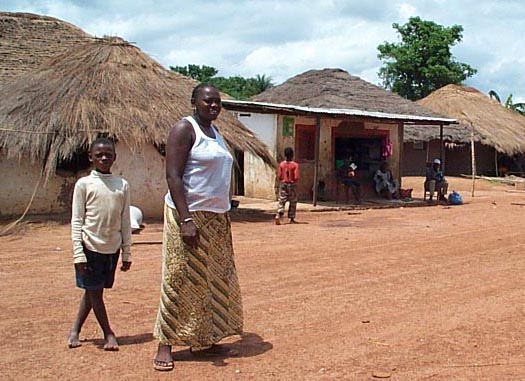
Richard Carroll stopped by the village of Boganongon, where he had previously served as a Peace Corps volunteer
Our scientists are making their way back to their normal lives, but the many of the people who assisted the scientists throughout the expedition have no plan to escape the violence -- this is their home. Lee Poston forged a bond with Jean-Bosco Kpanou, who remains in the forest.
The latest troubles in CAR are especially heartbreaking for Jean-Bosco Kpanou, who has dedicated his life to saving the region's plants and animals and promoting his country as a wildlife-lover's paradise.
Jean's story is one of how an unknown, under-educated village youth became the principal driving force behind the creation of the Dzanga-Sangha Dense Forest Special Reserve and the Dzanga-Ndoki National Park. As a result of his Herculean efforts, he was awarded one of conservation's most prestigious awards -- the Getty Prize -- two years ago.
The story began when WWF's Richard Carroll returned to CAR to undertake a census of lowland gorillas and forest elephants. On his way, he stopped by the village of Boganongon, where he had previously served as a Peace Corps volunteer. This tiny village of 400 Gbaya people is nestled in the rolling savannas and gallery forests of the Lobaye region.
Young Jean-Bosco had worked with Richard during his Peace Corps stint, feeding fish and cutting the grass. On his return, Richard found that Jean's father had died and left no money for Jean to continue school in the capital, so he had to return to help his mother in the fields. When Richard told him he was heading to the forest in search of elephants and gorillas, Jean begged him to come along, saying it would remind him of memories of hunting forest buffalo along the Lobaye River. He says that he gradually grew to dislike his father's wildlife poaching, saying he prefers to "conserve rather than destroy."
So Jean and Richard packed up the 10-year-old Toyota pickup and headed down the muddy roads to Bayanga.
Jean was immediately enamored with the forest and quickly proved his mettle as a reliable camp assistant. He was so enthusiastic that Richard trained him in gorilla and elephant census techniques and he became a research assistant. Along with Richard's wife, Rita and a team of BaAka trackers, they completed 2,000 kilometers of transects and exposed for the world the phenomenal richness of the forest.
Along the way, Jean did everything from walking thousands of kilometers mapping wildlife concentrations and human activities to paddling a dugout canoe for days at a time. He wielded a machete to open up old logging roads, fixed the truck, changed tires and treated wounds for the BaAka. As a research assistant, he collected, pressed and processed thousands of botanical specimens, tracked and monitored gorillas and elephants and helped with awareness raising, turning poachers into allies.
Thanks in large part to the help of Jean, the project received additional funding, allowing the Dzanga-Sangha Dense Forest Preserve and the Dzanga-Ndoki National Park to be established in 1990. Once the project was funded, Jean was again a jack-of-all-trades. He took charge of infrastructure development, opening and maintaining the road system, building protection camps, training the new protection staff in the ecology of the forest and managing program staff.
Since being awarded the Getty Prize, Jean has been using his skills on a wider basis, working at the ecoregional scale in Gabon and other countries. But his heart is always in CAR, where he still has many relatives.
"I love what I do," he says. "It's marvelous to know that I will leave behind a better planet for my children."
Perhaps the best description of Jean appeared in the essay Richard wrote nominating him for the Getty Prize:
"Jean is not a Functionaire, has elementary school education and has no wealthy family connections to allow him to reach prominence or have political access. What Jean possesses is a heart of gold, a strong back, a willing mind and a heartfelt desire to see Central Africa survive and thrive. Jean-Bosco Kpanou, now principal gorilla researcher in Dzanga-Ndoki, grassroots conservationist, dedicated citizen of the Central African Republic, is the kind of rare person who makes species conservation happen in the field, on the ground. Without this kind of 'ground-truth' none of our international conservation efforts could succeed."
